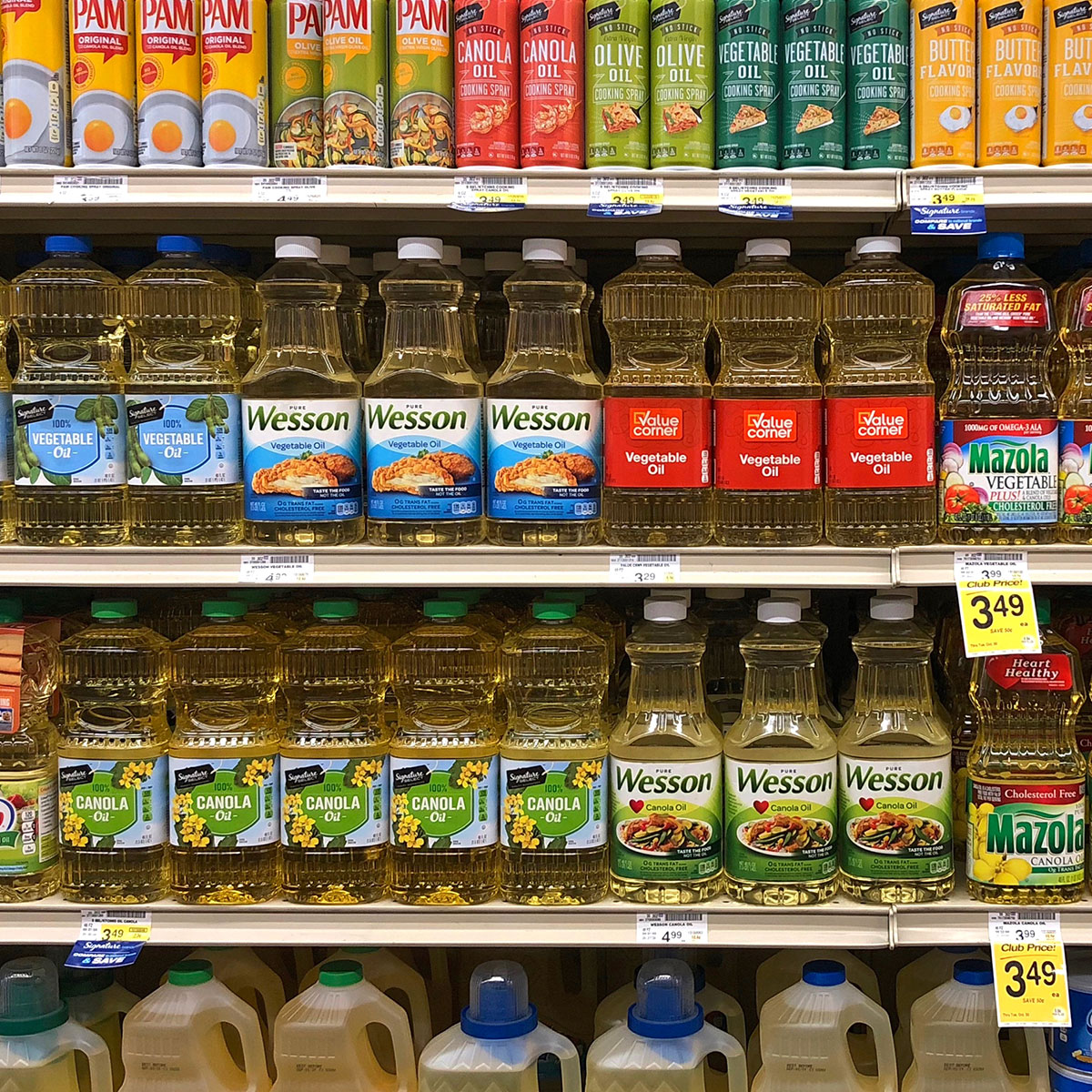
1. Seed Oils
Here's one you may have heard about already: seed oils. The processing methods of these popular oils make them harmful to the brain, according to Nault. "These industrial oils undergo extreme heat processing, chemical refining, and bleaching, leaving them rancid and loaded with oxidized omega-6 fats that create systemic inflammation, including in the brain," she explains. Some studies indicate that consuming these oils in excess can impair neuronal communication, deplete brain-protective omega-3s, and contribute to cognitive decline. When in doubt, it's best to reach for healthier fats like grass-fed butter, ghee, tallow, single-source organic extra virgin olive oil, and organic cold-pressed coconut oil. You'll probably find your meals taste better this way, too!
2. Gluten (Modern Wheat)
Many people follow a gluten-free diet these days, whether it's out of necessity or simply because they're seeking a healthier lifestyle. While gluten itself isn’t artificial, modern wheat is heavily processed and treated with harmful chemicals, Nault warns. "Almost all wheat is sprayed with glyphosate (a known neurotoxin) just before harvest, making it nearly impossible to consume gluten without exposure to this chemical," she says. According to her, even if you don’t experience immediate digestive distress, gluten-related symptoms can be neurological, contributing to brain fog, anxiety, depression, poor memory, and mood swings. Instead of wheat-based products, choose whole-food, gluten-free carbohydrates like organic fruit, raw honey, white rice, and potatoes for stable energy without the risk of inflammation.
3. Artificial Sweeteners
Artificial sweeteners are often viewed as healthier alternatives to refined sugar (which certainly comes with serious health risks) but as it turns out, they may do more harm than good—including for brain health. "Research shows they disrupt the gut-brain axis, deplete serotonin levels, and overstimulate glutamate receptors, which can increase anxiety, depression, and even neurodegeneration," says Nault. Aspartame (found in our beloved Diet Coke) is particularly concerning because it breaks down into methanol and formaldehyde in the body—both of which can be toxic to your nervous system. Still want to enjoy a bit of sweetness? We don't blame you—but consider going the natural route with options like organic raw honey, maple syrup, or organic coconut sugar. Your body will thank you!
4. Artificial Food Dyes
Put the Shamrock Shake down! The bright colors in many processed foods can pose a risk to your brain health, according to Nault. "Artificial food dyes, particularly Red 40 and Yellow 5, have been directly linked to hyperactivity, anxiety, mood disorders, and cognitive impairment," she warns. The concerning thing about these dyes is that they can cross the blood-brain barrier, disrupt neurotransmitters, and contribute to nervous system dysregulation. Some studies even suggest that food dyes may increase aggression and irritability, especially in children. Luckily, there are many natural alternatives to artificial colors, including beet powder, berry powder, turmeric (anti-inflammatory!), spirulina, and saffron.
5. Monosodium Glutamate (MSG)
MSG is a common additive used to enhance flavor, but unfortunately, Nault says it can have serious effects on brain health. "MSG is an excitotoxin that overstimulates neurons to the point of damage, leading to headaches, mood swings, anxiety, and difficulty concentrating," she explains. It also depletes glutathione—that's your brain’s master antioxidant—making it more vulnerable to oxidative stress. For a flavor boost without the risk, Nault recommends reaching for Himalayan salt, seaweed flakes, organic herbs, or nutritional yeast. You may be surprised how great it tastes!
The Bottom Line
It's important to remember that your diet is important to more than just your waistline; the foods we eat play a crucial role in how we think and feel. Cutting out these inflammatory and neurotoxic ingredients could help reduce anxiety, depression, and brain fog. Of course, treating yourself to your favorite foods every once in a while is generally fine, and no diet change can work a miracle—but making efforts to nourish your body with whole foods in place of processed options is always a good way to go.


